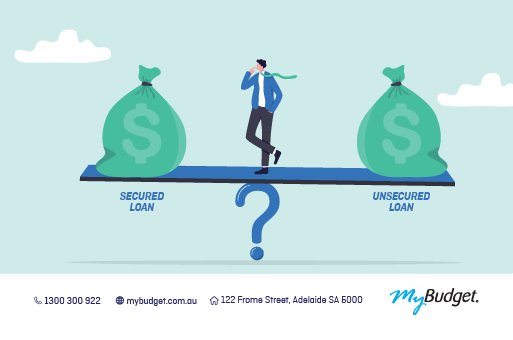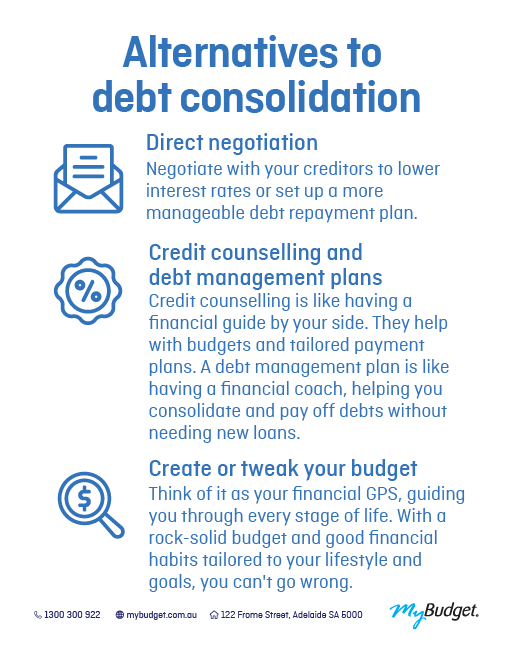Debt consolidation: is it right for you?
Debt consolidation can simplify repayments, but it’s not always the right solution. Learn how debt consolidation works, explore the pros and cons of consolidating your debts, and discover whether it’s the best option for your financial situation.
Ever feel like every debt repayment you make disappears into the black hole of interest charges? You might have asked yourself what is debt consolidation? And wondered if it could be your saving grace. Well, you’re not alone. Together, we’ll break down how debt consolidation works, weigh up the pros and cons, and share two real MyBudget client experiences. Is debt consolidation the right choice for you? Let’s find out!
What is debt consolidation?
So what does debt consolidation mean? Debt consolidation is a way to round up all of your debts and turning them into one simple loan. The idea is to slash those debt repayments by bundling everything together at a lower interest rate and have just one streamlined payment and one single interest rate to manage, instead of a whole circus of bills.
Is it a good idea to consolidate your debt?
Before making any big moves, it’s crucial to explore your options and have a chat with a financial expert to find out if a debt consolidation loan is a good idea. Trust me, it’s the smart thing to do! Remember, there’s no one-size-fits-all when it comes to money matters.
Think of this article as your crash course in how debt consolidation works, served up with a side of realness. But before we get ahead of ourselves, let’s make sure you’re armed with all the info you need.
Types of debt consolidation loans
Let’s break down two types of debt consolidation loans.

Secured vs. unsecured consolidation loans
Like most loans, they can be secured against an asset, or unsecured, which generally attracts a higher interest rate. Let’s break down the two main types of debt consolidation loans:
Secured debt consolidation loan
With a secured debt consolidation loan, you’re putting up a specific asset, usually your beloved home as collateral. It’s like offering a little insurance to sweeten the deal for the lender so their risk is minimised if you can’t stick to the repayment terms. Often called mortgage refinancing, it’s a solid option if you’ve got property to back up this type of loan.
Unsecured debt consolidation loan
To credit providers, an unsecured loan is like a financial tight-rope act without a safety net. Without the security of collateral, lenders play it safe by hiking up interest rates. Why? Well, they’re taking a leap of faith, placing trust in your ability to make the loan repayments without any tangible backup. So while it might offer an alternative to pledging your assets, it comes at a cost: a higher interest rate.
So, whether you’re putting your house on the line or daring to go unsecured, make sure you weigh the debt consolidation options carefully. Each path has potential benefits and risks, and what works for one person might not work for another.
How does debt consolidation affect your credit score?
Understanding how debt consolidation works with your credit score is key. Equifax says that Consolidating debt means taking out a new loan, which can impact your credit score. The good news? It can improve your credit utilisation ratio (that’s the percentage of your available credit you’re actually using) and payment history. But it’s not all sunshine and rainbows. Applying for a consolidation loan also triggers a hard inquiry, temporarily lowering your score. Plus, a new account can decrease the average age of your accounts. It’s definitely a balancing act!
What are the benefits of debt consolidation?
- Lower interest rates: say goodbye to those eye-watering interest rates on credit cards and hello to potentially lower ones
- One payment to rule them all: simplify your life with just one monthly repayment instead of juggling a circus of bills. No more late payments when you consolidate your debts!
- Boost your credit score: improve your credit utilisation ratio and payment history with consistent, on-time payments
- Better cash flow: lower monthly payments mean more money in your pocket for fun stuff (or other important things like emergencies)
- Debt-free sooner: with lower rates and a clear plan, you might just pay off your current loans faster. Smashing goals… here you come!
What are the risks of debt consolidation?
Before you sign up for debt consolidation loan, let’s talk about the top 5 risks:
- Collateral risk: putting your home or property on the line can be nerve-wracking
- Higher cost over time: extending the loan term? That’s extra time for interest to cosy up and compound over the long haul, increasing the debt balance
- Debt temptation: clearing credit card debt might tempt you to spend again. Discipline is key!
- Fees: watch out for those pesky establishment fees, balance transfer fees and closing fees. They add up fast!
- Credit score hits: applying for a new loan can temporarily lower your credit score and credit age.
When you tie your debts to your home sweet home, there’s more at stake than just your credit score. So, unless you’re feeling rock-solid about your income and job security, it might be time to pump the brakes and explore some other options.
What are the alternatives to debt consolidation?
Debt consolidation isn’t always the answer. Check out these 3 alternatives:
- Direct negotiation: negotiating directly with your creditors can help lower interest rates or set up a more manageable repayment plan. It’s worth making those calls, you might be surprised at how flexible creditors can be with their payment terms! If you need assistance, MyBudget’s Debt Arrangement Team is here to help. They tirelessly negotiate on your behalf to secure better terms, reduce interest rates, extend repayment terms, or combine multiple debts into a single, more manageable debt repayment. Let our team do the negotiating for you!
- Create or update your budget: at MyBudget, we’re a tad biased (okay, maybe a lot!) because we believe budgeting is the most important way to get a strong hold of your debt and visualise all of your finances. Think of it as your financial GPS, guiding you through every stage of life. With a realistic budget and good financial habits tailored to your lifestyle and goals, you can’t go wrong. Whether you need a budget refresh or are just starting out, a thorough look at your finances and some discipline could help you dodge debt consolidation altogether
- Credit counselling & debt management plans: the National Debt Helpline and community-based credit counselors offer advice and negotiation assistance. These services can be valuable, but if you find you require a more comprehensive, personalised management, MyBudget provides tailored, hands-on support to ensure you get the best possible outcome.

Should I consolidate all my debt?
Now, the million-dollar question: Should you toss all your debts into the debt consolidation blender? Now that you’re familiar with the concept of a debt consolidation loan, it’s time for some introspection. Your budget holds the answers, revealing how much debt you can feasibly repay and how fast. If refinancing is not the solution, don’t worry! Your budget can also serve as a roadmap for the alternative strategies we’ve just discussed.
Real-life debt consolidation stories with MyBudget
MyBudget clients, Callum and Sally: A debt consolidation victory
Let me tell you about Callum and Sally; a couple who recently joined the MyBudget family. They were juggling an overwhelming 17 different debts, including some private loans from family members, on top of their home loan and personal loans. Their monthly debt repayments totaled $5,841, leaving them financially stretched and stressed.
MyBudget Loans stepped in and fought hard to offer a loan for debt consolidation that would make a real difference. Through their dedicated efforts, they managed to bring their monthly payments down to just $4,099, a saving of $1,741 per month! This massive reduction allowed them to repay their family debts and even freed up an additional $33,000 for much-needed home renovations.
But the support doesn’t stop there. In six months, we’ll be back in contact with Callum and Sally to review their financial health and see if we can help them save even more. At MyBudget, we’re committed to providing ongoing financial management and support, ensuring our clients not only get out of debt but also thrive financially.
Useful tools when considering debt consolidation for your needs: Debt consolidation calculator
MyBudget client, Jerry: When debt consolidation isn’t the answer
Not every debt consolidation story has a fairy-tale ending. Find out how MyBudget client Jerry used an alternative to debt consolidation to get out of debt.
Jerry was drowning in overdue bills and struggling with the rising cost of living. His mental health was taking a hit, and he was surviving off his overdraft, thinking that debt consolidation was his only way out.
Jerry called MyBudget. Our expert Personal Budget Specialists created a realistic budget for him, negotiating with his creditors and making sure all his bills were paid on time. No more running from late payment notices and sleepless nights!
Fast forward a year, and Jerry’s outcome is nothing short of miraculous. He managed to save $5,000 and started paying down his overdraft. The relief he felt was immense. He was no longer overwhelmed by his finances and could see a way out of his situation. With a clear path to financial stability, Jerry’s mental well-being significantly improved.
Jerry’s story is a telling reminder that sometimes, the best solution isn’t another loan. It was a tailored budgeting plan and creditor negotiations offered by MyBudget that truly made the difference. This structure and support provided Jerry with a sustainable solution to regain control of his finances and get out of debt for good.
Final thoughts on debt consolidation
So, what’s the moral of the story? A debt consolidation loan might sound like the golden ticket, but it’s not always the ultimate solution. When it comes to weighing up the pros and cons of refinancing, it’s all about balance. So it’s best to consider both sides before making any decisions! Sometimes at the end of the day, it’s all about getting down and dirty with your budget, slashing expenses, and showing those debts who’s boss.
Got burning questions about debt consolidation? Ready to kick those debts to the curb? Give us a shout, and let’s whip those finances into shape. Enquire online or call 1300 300 922 today.
